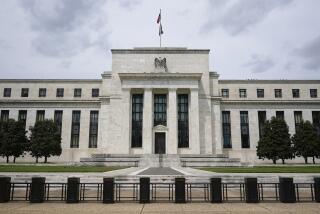You Write a Check, System Rates Your Credit for Retailers
Consumers are accustomed to dealing with credit bureaus when they apply for a loan. Now they may have their credit rated every time they write a check or use a debit card.
Soon, retailers will be able to use a new computerized credit-rating system to decide not only whether they’ll take your check, but how big a check you can write. And banks will be able to use it to determine whether they will let you open a checking account and what kind of fees you will pay.
Deluxe Corp., the biggest check printer in the country, has joined with Fair, Isaac & Co., a San Rafael, Calif.-based credit-scoring company, and Acxiom Corp., a data warehouse firm, to create the system for rating a merchant’s risk of accepting an individual’s checks and debit cards.
“This is not so much a product as an alliance of three companies to address the growing fraud that ultimately consumers pay for,” said Gregory Bjorndahl, a marketing executive at Deluxe, which is based in Shoreview, Minn.
The project already has some consumer advocates worried that mistakes in credit records will become even more of a threat to an individual’s privacy and financial well-being. The companies said they will strive to avoid inaccuracies to keep the business of the banks they deal with.
Deluxe will gather information from banks about bounced checks and related payment problems. Acxiom, based in Conway, Ark., will combine that data with other financial information and give it to Fair Isaac, which will use it to generate a rating.
Under the system, when a consumer presents a check or debit card to a participating retailer, the individual’s account is identified by punching a code into a computer or swiping a card containing a magnetic strip or microchip through an electronic reader.
Deluxe sends back the rating to the retailer’s computer. The clerk never sees the actual rating but is instructed, based on predetermined criteria, whether to accept or reject the transaction.
The service will also be marketed to banks to help them decide whether to open a checking account for a customer and, if so, what kind of account and how much to charge. Banks can also use the scoring system to determine automated teller machine withdrawal limits and whether to issue debit cards.
Deluxe said the new service, to be called the Debit Bureau and to be available within a few months, is a way to tailor financial products to meet customers’ needs while protecting banks and retailers from bad transactions. Retailers and banks will pay for the service and will decide whether to pass on that cost to consumers. The developers of the service say it will cut merchants’ and bankers’ expenses by reducing losses.
The Debit Bureau is designed to enable banks to charge for their services based on a person’s check-writing history, much as a lender charges more to a borrower with tainted credit.
As part of their contract with Deluxe, retailers or banks are required to give consumers a toll-free number to call to find out why they were rejected, Bjorndahl said. Consumers who call the number are not given the score arrived at by Fair Isaac, which has successfully argued in the past that its scoring is based on a proprietary model.
However, consumers are told why the transaction was rejected. If the rejection is based on false information, the consumer must work with the company providing the information to correct it, although Deluxe will intervene in a dispute between the two parties, Bjorndahl said.
That system is not sufficient to prevent mistakes, said Edward Mierzwinski of the United States Public Interest Research Group, a consumer advocacy group. He believes that as much as a third of credit reports, which are used as the basis for the Fair Isaac scoring, may contain inaccurate information.
“Nobody is telling consumers that their ability to cash a check, rent a car or apply for a credit card is increasingly [made] on the basis of some credit-scoring model that they don’t even know exists.”
Bjorndahl and J.A. Blanchard, chairman and chief executive of Deluxe, said there is a strong incentive to make sure the information is accurate. “If it’s dirty data, the bank’s not going to call me any more,” Blanchard said.
More to Read
Inside the business of entertainment
The Wide Shot brings you news, analysis and insights on everything from streaming wars to production — and what it all means for the future.
You may occasionally receive promotional content from the Los Angeles Times.









